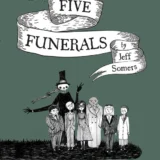
OBIR: Occasional Biased and Ignorant Reviews reflecting this reader’s opinion.

SPECULATIVE NORTH issue #6, Vol. 2 No. 3. December, 2021.
Publisher: TDotSpec Inc., Toronto, Ontario, Canada.
Editors: Lead Editor David F. Shultz; Fiction Editor Don Miasek; Articles Editor Andy Dibble; Poetry Editor W.T. Anderson.
Cover Art: Marco Marin.
FICTION:
Arturo – by Amorina Kingdon
Premise:
The bond between a Captain and a spaceship is better than sex, unless a third party shows up.
Review:
The Captain is amoral, relishing any job accomplished by any means as long as he and his ship are happy. Their mental bond is superficially a unity, but it’s more of a symbiotic relationship. They experience each other, feel each other, in a sense ride each other. The ultimate piloting gestalt. I had a pretty good bond with my bicycle when I was a kid, but nothing like this.
A crew exists, with roles to fulfill: maintenance, gunner, etc. But only the Captain bonds with his ship Arturo. Still, when he meets a “wire,” a woman connected to an A.I., and only she can rejuvenate the aging ship so it can remain in top form… bound to impress Arturo, maybe too much.
Like any classic love triangle, opportunity abounds for cliché and formula. Not this story. As in the best of human-threesome stories, characters are explored with subtlety and the relationship develops along unforeseen lines. Funny how love, or perhaps I should say passion, can expand to include pride and paranoia. Especially if, like the Captain, you overthink the logic of emotion. Fundamentally though, this story is about the perils of independence becoming dependant and the resulting resentment and jealousy awareness of the problem brings.
There’s a lot to unpack while reading this. The simple concept of a man and his machine is really an examination of a man and his ego. Makes me wonder; are we truly self-confident only when we are completely alone? This story doesn’t answer that question, but it did trigger me to ask. Not a simple story. Quite thought-provoking.
The Time Traveler’s Cat: A Looping Tail – by Quincy Lee
Premise:
Time travel is itself a paradox and therefore cannot exist.
Review:
This isn’t a story. It begins with a story, then expands into multiple versions to demonstrate why the original story, and all its variations, are flat-out impossible and therefore constitute fantasy rather than science fiction. More of a monograph devoted to pointing out anyone who believes in the possibility is a deluded fool.
Sure, time travel is a hypothetical concept, along with wormhole travel, immortality, and faster-than-light vacation trips. Some of these daydreams can even be proven with mathematics, especially when run through a supercomputer. What is often not mentioned is that some aspects of mathematics have no practical application in that the math is abstract to the point of having zero relationship to the universe as it actually exists and functions. In a sense, certain math specialists are actually surrealist artists swirling in delirium. Part of the reason hyper-advanced math can be so addictive, amounting to a perpetual intellectual orgasm. Or so I’ve been told by a professional mathematician.
Personally, never having memorized the times tables, and prone to counting on my fingers, I’m the equivalent of a math virgin. So, when someone tells me how sexy math is, I really can’t judge. Point is it is a modern myth that mathematical formulas, merely because they are consistent within themselves, are always ”real.” Sometimes. But the computer law of “garbage in, garbage out” applies. Even worse, some of the most perfect math formulas are logical, yet total nonsense. Math is a tool. It can be used. It can be abused. It can fill numerous blackboards and represent nothing. It is, perhaps, the ultimate nerd passion.
In short, approach the possibility of time travel, or its impossibility, with an open mind. Ignore the “fact” that some mathematics predict it can be done. Just examine the logic of the premise, which I won’t reveal here since it is the basis of the multiple riffs on the topic this story presents, but which strikes me as entirely logical. Trouble is, logic no more provides “truth” than does mathematics. In short, by the end of the story I am in agreement with the author, but unsure whether the premise is correct. Or, to put it another way, totally clueless as usual.
Have fun reading this story. It is challenging.
Never Underestimate a good Defensive Spell, or Your Sister – by M.E. Garber
Premise:
Odessa is enjoying her first witches convention, till her older sister tricks her into entering a spell-casting competition together.
Review:
Sisters are supposed to look after each other, and they do, but no more than brothers will. In short, sibling rivalry knows no gender. It’s universal. Makes for tension.
Interestingly, this story involves logic, the logic of making right choices. Since the “correct” choice depends on anticipating what the opponent does, a healthy dose of suspicion and paranoia is necessary. Like any competition dependent on logic, I suppose. Chess, for example. Character and personality traits, or understanding thereof, can be extremely important. In grandmaster-chess ploys to distract or confound are subtle, in order to avoid disqualification, but common as dirt. How much more so in sibling contests when the combatants are intimately familiar with each others quirks and fears. Result, an amusing story that moves along in a sprightly fashion. Even better, the ending is logical, convincing, and feels utterly natural to the character. Very well written.
Virtually Yours – by Nina Munteanu
Premise:
A virtual reality love affair is one thing, but what if your avatar is as real as you are?
Review:
The tricky part is, all three work in the same facility. Vincent is one of a hundred overseers working in an office apart from thousands of virtual-enhanced clerks monitored by the overseers. They can see each other, communicate, but each overseer, including Vincent, is merely a name and a presence unconnected with their bodies glimpsed through the office windows separating one group from the other. A further degree of separation is ensured by Vincent utilizing the senses of Jake, his data manager, to make love to Katherine, one of his underlings, in a purely imaginary virtual setting. Katherine appreciates it. Jake is totally unaware, rather like a computer hijacked into being a zombie computer without the owner knowing but wondering why his computer has gotten so slow.
Given sufficiently advanced technology combined with our traditional human lusts which will probably last unchanged as long as our species survives, the premise is credible, at least hypothetically. But of course, being human, we’re bound to screw up one way or another and the complications that ensue when Vincent’s Casanova game comes unglued make for fascinating extrapolation. If you think your love life is complicated now, just wait a century or two. This story offers fair warning of the future. Beware.
Lodestar – by Christopher J. Kattner
Premise:
Damarus and her father, Jasper, the ship’s captain, are the only crew members left aboard a starship struggling to find a star, any star.
Review:
The last time the ship folded space things went wrong and the ship emerged in a kind of limbo. Now they’re approaching a red-giant and magnetar binary. With a little luck and a lot of precise navigation they should be able to slingshot around the combo and build up enough speed to fold space and get back to Earth. Simple, no?
Trouble is, Damarus has never forgiven her father for the initial failure and resents the ten years she’s spent growing up as a teenager aboard the ship with literally nothing to do. She speaks to her father as little as possible. She’s even managed to find a place she can hide from him. He, in turn, is handicapped by shame and a sense of inadequacy. Trust issues keep exploding like an onboard supernova. Probably fair to say both are a little crazy by now.
The science aspect, a source of unexpected complication which serves the plot, nevertheless takes a back seat to what is essentially a personality clash between father and daughter. Can they find the strength to reconcile? Should they even bother when there’s a good chance they will both die if dad makes yet another mistake in his piloting? And even if they survive and get back to Earth, what then?
It is implied that dysfunctional family dynamics are yet another eternal trait of the human race. Just because we can fold space and zip from star to star doesn’t mean father and daughter are willing to share quality time. Where’s a family counsellor when we need one? None on this ship. Yet Damarus and Jasper have to work together to fold space correctly. Can they do it?
Thing is the unanticipated surprise resolution of the family conundrum is dependant on the science problem underlying the story, thus everything gets tied neatly together at the end. Well done. An old-fashioned, quietly entertaining story whose pace and skillful intertwining of character study and scientific difficulties I found satisfying and pleasing. Enjoyed it.
The Braider and the Braid – by Chris Nelson
Premise:
Think of the “Tales of a Thousand and One Nights” only the Sultan is a gigantic alien scorpion out to destroy all of humanity. Bit of a problem that. Miss Scheherazade, real name Layla Asghari, is out to save us all as best she can.
Review:
This is a self-conscious self-referential story that opens up layer after layer like an unfolding blossom featuring none other than the author Chris Nelson himself as the protagonist. I find myself feeling a bit giddy attempting to follow the logic of it all. Lots of symbolism. I’m guessing there are easter eggs and obscure references a’plenty if I only knew enough to recognise them or understand what they mean. It’s a gutsy story. It’s spectacular in its way, a manipulation of the reader’s mind that is both interesting and amusing, if perhaps a trifle confusing. It’s certainly original and possibly unique. I’m impressed. Pretty sure it would make James Joyce giggle at the audacity of it (he had quite the sense of humour, you know). The ending is a nifty summation that suits the story perfectly.
I’m not sure how the average reader will respond but it strikes me as the kind of story writers should read. Cutting edge stuff. Inspirational. Nothing less than a challenge, a gauntlet flung. Who dare pick it up?
Florne’s Ghost – by Emi Pellim
Premise:
Florne released a single, “Homebaked,” involving multiple ambient background sounds meant to evoke childhood nostalgia. Somehow she missed the brief child’s scream on one of the tracks. The record hits number one in the charts.
Review:
The police are able to determine a child went missing just hours before Florne recorded the ambient sounds near the lake. Divers find what’s left of the body. “Homebaked” stays on the charts because of its notoriety. Fans even make pilgrimages to the lake. Some of them die under mysterious and dreadful circumstances. Is the lake haunted?
In a sense this story is about being haunted by disappointment, failure, and guilt. In addition to the worry that a murdering ghost may be active at the lake. What unifies everything is the expose of the fickle attention span of the public. Why even bother trying to be famous? Especially if the effort is remarkably similar to what appears to be public relations gimmicks inflicted by an increasingly desperate ghost? Who is the real ghost here? Are popular entertainers as doomed as your average ghost? Interesting questions raised.
What is particularly intriguing is that the story answers these questions. Enough to make me not want to be famous, or even leave the house for that matter. A supernatural story that does some haunting of its own. Hard to dismiss it from mind. Effective.
POETRY:
And now, a confession. Been writing this review at the end of a long day that involved being driven from Nanaimo to the British Columbia Aviation Museum next to the Victoria Airport and back again. Much fun and great scenery cresting the Malahat highway over the mountains but at this point, close to the deadline for this review, I can barely keep my eyes open. Too brain dead to review the remainder of this issue. Got to get to bed.
So, apologies to poet Linda D. Addison, and editors David Shultz and Andy Dibble. I can but list your contributions. At least it provides a holistic grasp of the variety of material to be found herein.
Nightshift – by Linda D. Addison
River Share – by Linda D. Addison
Whale Riding – by Linda D. Addison
NON-FICTION:
Interview with Linda D. Addison
Craft Psychic Distance – by David Shultz
Psychic Distance and First person – by Andy Dibble
CONCLUSION:
As you can tell from my reviews of the stories, a first class speculative fiction magazine you owe it to yourself to read.
Check it out at: < Speculative North #6 >









